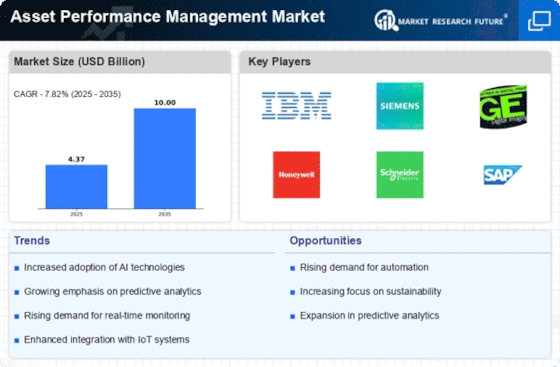Asset Analytics
Predictive Maintenance
Risk Management
Compliance Management
On-Premises
Cloud-Based
Hybrid
Manufacturing
Oil and Gas
Transportation and Logistics
Utilities
Software
Services
North America
Europe
South America
Asia Pacific
Middle East and Africa
North America Outlook (USD Billion, 2019-2035)
North America Asset Performance Management Market by Application Type
Asset Analytics
Predictive Maintenance
Risk Management
Compliance Management
North America Asset Performance Management Market by Deployment Type
On-Premises
Cloud-Based
Hybrid
North America Asset Performance Management Market by End Use Industry Type
Manufacturing
Oil and Gas
Transportation and Logistics
Utilities
North America Asset Performance Management Market by Component Type
Software
Services
North America Asset Performance Management Market by Regional Type
US
Canada
US Outlook (USD Billion, 2019-2035)
US Asset Performance Management Market by Application Type
Asset Analytics
Predictive Maintenance
Risk Management
Compliance Management
US Asset Performance Management Market by Deployment Type
On-Premises
Cloud-Based
Hybrid
US Asset Performance Management Market by End Use Industry Type
Manufacturing
Oil and Gas
Transportation and Logistics
Utilities
US Asset Performance Management Market by Component Type
Software
Services
CANADA Outlook (USD Billion, 2019-2035)
CANADA Asset Performance Management Market by Application Type
Asset Analytics
Predictive Maintenance
Risk Management
Compliance Management
CANADA Asset Performance Management Market by Deployment Type
On-Premises
Cloud-Based
Hybrid
CANADA Asset Performance Management Market by End Use Industry Type
Manufacturing
Oil and Gas
Transportation and Logistics
Utilities
CANADA Asset Performance Management Market by Component Type
Software
Services
Europe Outlook (USD Billion, 2019-2035)
Europe Asset Performance Management Market by Application Type
Asset Analytics
Predictive Maintenance
Risk Management
Compliance Management
Europe Asset Performance Management Market by Deployment Type
On-Premises
Cloud-Based
Hybrid
Europe Asset Performance Management Market by End Use Industry Type
Manufacturing
Oil and Gas
Transportation and Logistics
Utilities
Europe Asset Performance Management Market by Component Type
Software
Services
Europe Asset Performance Management Market by Regional Type
Germany
UK
France
Russia
Italy
Spain
Rest of Europe
GERMANY Outlook (USD Billion, 2019-2035)
GERMANY Asset Performance Management Market by Application Type
Asset Analytics
Predictive Maintenance
Risk Management
Compliance Management
GERMANY Asset Performance Management Market by Deployment Type
On-Premises
Cloud-Based
Hybrid
GERMANY Asset Performance Management Market by End Use Industry Type
Manufacturing
Oil and Gas
Transportation and Logistics
Utilities
GERMANY Asset Performance Management Market by Component Type
Software
Services
UK Outlook (USD Billion, 2019-2035)
UK Asset Performance Management Market by Application Type
Asset Analytics
Predictive Maintenance
Risk Management
Compliance Management
UK Asset Performance Management Market by Deployment Type
On-Premises
Cloud-Based
Hybrid
UK Asset Performance Management Market by End Use Industry Type
Manufacturing
Oil and Gas
Transportation and Logistics
Utilities
UK Asset Performance Management Market by Component Type
Software
Services
FRANCE Outlook (USD Billion, 2019-2035)
FRANCE Asset Performance Management Market by Application Type
Asset Analytics
Predictive Maintenance
Risk Management
Compliance Management
FRANCE Asset Performance Management Market by Deployment Type
On-Premises
Cloud-Based
Hybrid
FRANCE Asset Performance Management Market by End Use Industry Type
Manufacturing
Oil and Gas
Transportation and Logistics
Utilities
FRANCE Asset Performance Management Market by Component Type
Software
Services
RUSSIA Outlook (USD Billion, 2019-2035)
RUSSIA Asset Performance Management Market by Application Type
Asset Analytics
Predictive Maintenance
Risk Management
Compliance Management
RUSSIA Asset Performance Management Market by Deployment Type
On-Premises
Cloud-Based
Hybrid
RUSSIA Asset Performance Management Market by End Use Industry Type
Manufacturing
Oil and Gas
Transportation and Logistics
Utilities
RUSSIA Asset Performance Management Market by Component Type
Software
Services
ITALY Outlook (USD Billion, 2019-2035)
ITALY Asset Performance Management Market by Application Type
Asset Analytics
Predictive Maintenance
Risk Management
Compliance Management
ITALY Asset Performance Management Market by Deployment Type
On-Premises
Cloud-Based
Hybrid
ITALY Asset Performance Management Market by End Use Industry Type
Manufacturing
Oil and Gas
Transportation and Logistics
Utilities
ITALY Asset Performance Management Market by Component Type
Software
Services
SPAIN Outlook (USD Billion, 2019-2035)
SPAIN Asset Performance Management Market by Application Type
Asset Analytics
Predictive Maintenance
Risk Management
Compliance Management
SPAIN Asset Performance Management Market by Deployment Type
On-Premises
Cloud-Based
Hybrid
SPAIN Asset Performance Management Market by End Use Industry Type
Manufacturing
Oil and Gas
Transportation and Logistics
Utilities
SPAIN Asset Performance Management Market by Component Type
Software
Services
REST OF EUROPE Outlook (USD Billion, 2019-2035)
REST OF EUROPE Asset Performance Management Market by Application Type
Asset Analytics
Predictive Maintenance
Risk Management
Compliance Management
REST OF EUROPE Asset Performance Management Market by Deployment Type
On-Premises
Cloud-Based
Hybrid
REST OF EUROPE Asset Performance Management Market by End Use Industry Type
Manufacturing
Oil and Gas
Transportation and Logistics
Utilities
REST OF EUROPE Asset Performance Management Market by Component Type
Software
Services
APAC Outlook (USD Billion, 2019-2035)
APAC Asset Performance Management Market by Application Type
Asset Analytics
Predictive Maintenance
Risk Management
Compliance Management
APAC Asset Performance Management Market by Deployment Type
On-Premises
Cloud-Based
Hybrid
APAC Asset Performance Management Market by End Use Industry Type
Manufacturing
Oil and Gas
Transportation and Logistics
Utilities
APAC Asset Performance Management Market by Component Type
Software
Services
APAC Asset Performance Management Market by Regional Type
China
India
Japan
South Korea
Malaysia
Thailand
Indonesia
Rest of APAC
CHINA Outlook (USD Billion, 2019-2035)
CHINA Asset Performance Management Market by Application Type
Asset Analytics
Predictive Maintenance
Risk Management
Compliance Management
CHINA Asset Performance Management Market by Deployment Type
On-Premises
Cloud-Based
Hybrid
CHINA Asset Performance Management Market by End Use Industry Type
Manufacturing
Oil and Gas
Transportation and Logistics
Utilities
CHINA Asset Performance Management Market by Component Type
Software
Services
INDIA Outlook (USD Billion, 2019-2035)
INDIA Asset Performance Management Market by Application Type
Asset Analytics
Predictive Maintenance
Risk Management
Compliance Management
INDIA Asset Performance Management Market by Deployment Type
On-Premises
Cloud-Based
Hybrid
INDIA Asset Performance Management Market by End Use Industry Type
Manufacturing
Oil and Gas
Transportation and Logistics
Utilities
INDIA Asset Performance Management Market by Component Type
Software
Services
JAPAN Outlook (USD Billion, 2019-2035)
JAPAN Asset Performance Management Market by Application Type
Asset Analytics
Predictive Maintenance
Risk Management
Compliance Management
JAPAN Asset Performance Management Market by Deployment Type
On-Premises
Cloud-Based
Hybrid
JAPAN Asset Performance Management Market by End Use Industry Type
Manufacturing
Oil and Gas
Transportation and Logistics
Utilities
JAPAN Asset Performance Management Market by Component Type
Software
Services
SOUTH KOREA Outlook (USD Billion, 2019-2035)
SOUTH KOREA Asset Performance Management Market by Application Type
Asset Analytics
Predictive Maintenance
Risk Management
Compliance Management
SOUTH KOREA Asset Performance Management Market by Deployment Type
On-Premises
Cloud-Based
Hybrid
SOUTH KOREA Asset Performance Management Market by End Use Industry Type
Manufacturing
Oil and Gas
Transportation and Logistics
Utilities
SOUTH KOREA Asset Performance Management Market by Component Type
Software
Services
MALAYSIA Outlook (USD Billion, 2019-2035)
MALAYSIA Asset Performance Management Market by Application Type
Asset Analytics
Predictive Maintenance
Risk Management
Compliance Management
MALAYSIA Asset Performance Management Market by Deployment Type
On-Premises
Cloud-Based
Hybrid
MALAYSIA Asset Performance Management Market by End Use Industry Type
Manufacturing
Oil and Gas
Transportation and Logistics
Utilities
MALAYSIA Asset Performance Management Market by Component Type
Software
Services
THAILAND Outlook (USD Billion, 2019-2035)
THAILAND Asset Performance Management Market by Application Type
Asset Analytics
Predictive Maintenance
Risk Management
Compliance Management
THAILAND Asset Performance Management Market by Deployment Type
On-Premises
Cloud-Based
Hybrid
THAILAND Asset Performance Management Market by End Use Industry Type
Manufacturing
Oil and Gas
Transportation and Logistics
Utilities
THAILAND Asset Performance Management Market by Component Type
Software
Services
INDONESIA Outlook (USD Billion, 2019-2035)
INDONESIA Asset Performance Management Market by Application Type
Asset Analytics
Predictive Maintenance
Risk Management
Compliance Management
INDONESIA Asset Performance Management Market by Deployment Type
On-Premises
Cloud-Based
Hybrid
INDONESIA Asset Performance Management Market by End Use Industry Type
Manufacturing
Oil and Gas
Transportation and Logistics
Utilities
INDONESIA Asset Performance Management Market by Component Type
Software
Services
REST OF APAC Outlook (USD Billion, 2019-2035)
REST OF APAC Asset Performance Management Market by Application Type
Asset Analytics
Predictive Maintenance
Risk Management
Compliance Management
REST OF APAC Asset Performance Management Market by Deployment Type
On-Premises
Cloud-Based
Hybrid
REST OF APAC Asset Performance Management Market by End Use Industry Type
Manufacturing
Oil and Gas
Transportation and Logistics
Utilities
REST OF APAC Asset Performance Management Market by Component Type
Software
Services
South America Outlook (USD Billion, 2019-2035)
South America Asset Performance Management Market by Application Type
Asset Analytics
Predictive Maintenance
Risk Management
Compliance Management
South America Asset Performance Management Market by Deployment Type
On-Premises
Cloud-Based
Hybrid
South America Asset Performance Management Market by End Use Industry Type
Manufacturing
Oil and Gas
Transportation and Logistics
Utilities
South America Asset Performance Management Market by Component Type
Software
Services
South America Asset Performance Management Market by Regional Type
Brazil
Mexico
Argentina
Rest of South America
BRAZIL Outlook (USD Billion, 2019-2035)
BRAZIL Asset Performance Management Market by Application Type
Asset Analytics
Predictive Maintenance
Risk Management
Compliance Management
BRAZIL Asset Performance Management Market by Deployment Type
On-Premises
Cloud-Based
Hybrid
BRAZIL Asset Performance Management Market by End Use Industry Type
Manufacturing
Oil and Gas
Transportation and Logistics
Utilities
BRAZIL Asset Performance Management Market by Component Type
Software
Services
MEXICO Outlook (USD Billion, 2019-2035)
MEXICO Asset Performance Management Market by Application Type
Asset Analytics
Predictive Maintenance
Risk Management
Compliance Management
MEXICO Asset Performance Management Market by Deployment Type
On-Premises
Cloud-Based
Hybrid
MEXICO Asset Performance Management Market by End Use Industry Type
Manufacturing
Oil and Gas
Transportation and Logistics
Utilities
MEXICO Asset Performance Management Market by Component Type
Software
Services
ARGENTINA Outlook (USD Billion, 2019-2035)
ARGENTINA Asset Performance Management Market by Application Type
Asset Analytics
Predictive Maintenance
Risk Management
Compliance Management
ARGENTINA Asset Performance Management Market by Deployment Type
On-Premises
Cloud-Based
Hybrid
ARGENTINA Asset Performance Management Market by End Use Industry Type
Manufacturing
Oil and Gas
Transportation and Logistics
Utilities
ARGENTINA Asset Performance Management Market by Component Type
Software
Services
REST OF SOUTH AMERICA Outlook (USD Billion, 2019-2035)
REST OF SOUTH AMERICA Asset Performance Management Market by Application Type
Asset Analytics
Predictive Maintenance
Risk Management
Compliance Management
REST OF SOUTH AMERICA Asset Performance Management Market by Deployment Type
On-Premises
Cloud-Based
Hybrid
REST OF SOUTH AMERICA Asset Performance Management Market by End Use Industry Type
Manufacturing
Oil and Gas
Transportation and Logistics
Utilities
REST OF SOUTH AMERICA Asset Performance Management Market by Component Type
Software
Services
MEA Outlook (USD Billion, 2019-2035)
MEA Asset Performance Management Market by Application Type
Asset Analytics
Predictive Maintenance
Risk Management
Compliance Management
MEA Asset Performance Management Market by Deployment Type
On-Premises
Cloud-Based
Hybrid
MEA Asset Performance Management Market by End Use Industry Type
Manufacturing
Oil and Gas
Transportation and Logistics
Utilities
MEA Asset Performance Management Market by Component Type
Software
Services
MEA Asset Performance Management Market by Regional Type
GCC Countries
South Africa
Rest of MEA
GCC COUNTRIES Outlook (USD Billion, 2019-2035)
GCC COUNTRIES Asset Performance Management Market by Application Type
Asset Analytics
Predictive Maintenance
Risk Management
Compliance Management
GCC COUNTRIES Asset Performance Management Market by Deployment Type
On-Premises
Cloud-Based
Hybrid
GCC COUNTRIES Asset Performance Management Market by End Use Industry Type
Manufacturing
Oil and Gas
Transportation and Logistics
Utilities
GCC COUNTRIES Asset Performance Management Market by Component Type
Software
Services
SOUTH AFRICA Outlook (USD Billion, 2019-2035)
SOUTH AFRICA Asset Performance Management Market by Application Type
Asset Analytics
Predictive Maintenance
Risk Management
Compliance Management
SOUTH AFRICA Asset Performance Management Market by Deployment Type
On-Premises
Cloud-Based
Hybrid
SOUTH AFRICA Asset Performance Management Market by End Use Industry Type
Manufacturing
Oil and Gas
Transportation and Logistics
Utilities
SOUTH AFRICA Asset Performance Management Market by Component Type
Software
Services
REST OF MEA Outlook (USD Billion, 2019-2035)
REST OF MEA Asset Performance Management Market by Application Type
Asset Analytics
Predictive Maintenance
Risk Management
Compliance Management
REST OF MEA Asset Performance Management Market by Deployment Type
On-Premises
Cloud-Based
Hybrid
REST OF MEA Asset Performance Management Market by End Use Industry Type
Manufacturing
Oil and Gas
Transportation and Logistics
Utilities
REST OF MEA Asset Performance Management Market by Component Type
Software
Services


















Leave a Comment